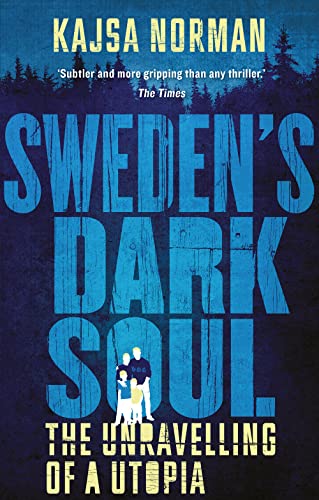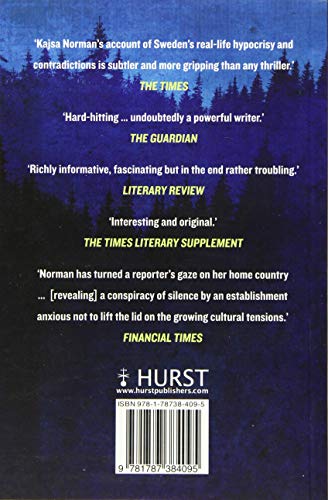Customer Services
Copyright © 2025 Desertcart Holdings Limited



Full description not available
S**R
Brilliant and courageous antidote to Utopian illusions
Although, to be honest, I found the author's insertion of some personal stories early on in the overall narrative irritating at first, the more I read the more hooked I became. What Kasja Norman has done is to tell Sweden's recent social history and expose its cover-ups in a manner that now makes it impossible to revert to the ridiculous Guardian-style politically correct view. The book is full of examples of government and media suppression of difficult truths about Sweden's disastrously failing multicultural policies. Should be read alongside Douglas Murray's 'Strange Death of Europe' and Ricardo Duchesne's 'Canada in Decay'. Norman's book is a real public service and is a great example of the standard of what contemporary journalism needs to return to.
P**N
Sweden Unravelled - noir is the word.
A brilliantly written account of modern Sweden which is not quite the Socialist paradise which it is often portrayed to be.The central story hinges around why a recent mass assault on teenage girls attending a state-sponsored pop music festival in the capital city Stockholm was hushed up by both the police and the Swedish media. Ms Norman reveals that, in contrast to its international image of a place of free expression and thought, in fact Sweden is the very opposite. It is a highly conformist society that discourages dissent and individual opinions. Ms Norman draws from the history of twentieth century Sweden (including its support for eugenics and the Nazi war effort) to present this enthralling picture of a troubled society in which unchecked immigration has caused huge and as yet unresolved social problems. A sad but gripping tale. One group of people who should feel utterly ashamed are those professional journalists working for mainstream Swedish media. Anyone reading this book will feel very differently about Sweden and the Swedish media as a consequence.
I**N
Essential Reading For All Swedes
Having previously lived many years in rural Sweden, I was aware of many of the issues addressed in this illuminating book. However, I now have a greater understanding of just why the country and its general culture is so full of unexpected and at times inexplicable paradoxes. This is an enlightening work that frankly should be mandatory reading for most Swedes, people I'm sure that have no true realisation of why they behave and believe as they do. Social engineering gone wild! Swedes will constantly tell you 'Bast i Varden! ' (Best in the world). With this book it's easy to see why they honestly believe this is the case, despite growing evidence.
S**M
Everything is not all it seems in the land of "unimind"
Not sure this book lives up to the review quotes on the jacket but it certainly lifts the veil on Swedish society being not quite the utopia many would like to think it is.Written by an expatriate Swede whose prior books did not involve Sweden, the author reacted to an Afrikaner she was interviewing who told her to stop being a typical Swede and "exporting advice". The impetus to re-examine her own country is book-ended by a recent scandal at a festival where the assault of teenage girls by mainly immigrant men went unreported by the Swedish media.The majority of the book follows three strands across many short chapters. The key strand is a history of Sweden and especially post WW2 how it became the liberal society of the 21st century but largely by using social engineering and control of the media and the church. This is interwoven with the stories of two recent young male immigrants who came to Sweden - an Armenian and a Polish Jew. I personally found this structure confusing and not contributing greatly to her main themes.By the end with the denouement of what happened after the festival and the two immigrants, I felt the key message of Swedish society's "unimind" approach enforcing conformity to a point where criticism is not acceptable had been oversold. One suspects Swedish society is not as unique in this dilemma as inferred and that in Sweden's case it is more nuanced than the structure of this book allows the issue to be examined.Nevertheless a fascinating insight into a country that many people probably hold a very different perception of, especially after the way it has handled very differently to other countries, the recent COVID-19 crisis in 2020.
G**N
Deeply worrying
A deeply worrying analysis of Sweden today, and how it got there. For anyone Swedish, this is a frightening wake-up call. You may not agree with everything the author says, but her criticism of Sweden’s monolithic debate climate, with room for only one accepted view, what the French call la pensée unique and what she calls the ‘Unimind’, is very true and apposite.
L**E
Very good book.
It's an excellent exposition of "The Case Against Swedishness", explaining the Swedish 'opinion corridor', and Swedes' wish to agree with other Swedes, the impact of 1930s social engineering, Sweden's questionable neutrality at the start of World War II and much else besides.It's less good (I think) on the country's problems with sexual harassment and crime committed by immigrants, and it's much too uncritical of Chang Frick, the anti-immigration populist news site founder who is her main protagonist.
T**S
Intriguing political analysis
Very interesting breakdown of the complex dynamics lieing behind Sweden's staggering 21st century transformation.
L**R
spectacularly good
Insights rattling the common view of Sweden - and a real page turner. Grartful to have bought it.
Trustpilot
2 weeks ago
1 week ago